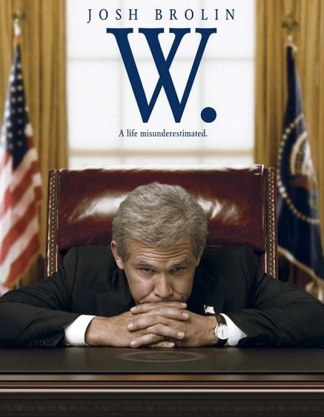
By Lynne Carty
Class of 2010
Whether you hated him or loved him during his eight years in the Oval Office, it would be impossible to deny that George W. Bush has been one of the most talked about and influential political figures of the new millennium. With today’s overly dedicated media tracking his every move, Americans have had a heavy dosage of “Dubya” Bush during his presidency and, especially during his last term, most would agree that he has been portrayed to the American public as the figurehead of the American downfall – more or less as a joke. Responding to the both the public and the media’s fixation on our 43rd president, Oliver Stone attempts to show a more human side of Bush Jr. in his sympathetic biopic titled simply, “W.”
Stone reveals the complex character of W. (played by Josh Brolin) piece by piece, switching back and forth between events during his two consecutive terms and flashbacks to all the years leading up to his run in the White House. The film opens with the famous meeting in which the Bush administration coined the term “axis of evil” – a slogan created to describe governments that were believed to have been supporting terrorism and attempting to obtain mass weapons of destruction. Once the meeting ends, the camera slowly zooms in on a brooding W., then suddenly jumps back to his wild initiation into a college fraternity, thereby giving us a glimpse into W’s days as a wisecracking, privileged, and reckless partyboy. Throughout the movie, Stone continuously switches the time period so as to delve into key moments throughout Bush’s younger years, while at the same time still moving along the presidency storyline based on events before and during the
war on Iraq. Some of the more interesting experiences that Stone recaps from the pre-politics days of Bush include his decision to give up the bottle in exchange for a fully Christian lifestyle, the first meeting and progression of the relationship between W. and first lady Laura Bush (played by Elizabeth Banks), and various scenes depicting the turbulent relationship between George Jr. and Sr.
A considerable portion of “W.” is spent on Bush Jr.’s failed attempts to appease his father, making it seem as though almost all of his campaigns and political efforts are carried out for that sole purpose. It’s hard to say whether or not Stone exaggerates the rockiness of this father-son relationship, but either way it makes for some fantastically intense scenes between the pair. In fact, W’s ongoing struggle to prove himself to Bush Sr. and step out of the shadow cast by the favored son of the family (Jebb Bush, played by Jason Ritter) may be one of the only entertaining parts of this movie for those who are not very familiar with Bush’s presidency or for those who just are not that interested in politics. After W’s pre-politics storyline catches up with the contemporary scenes of Washington D.C., the rest of the film more or less focuses on memorable cabinet meetings and the events leading up to and during the invasion of Iraq. These scenes are well executed and very informative; however, they do seem to lack an imaginative and creative quality– after a while, watching the cabinet meetings begins to feel like sitting through a history class lecture. Stone continues to take us through the ups and downs of Bush’s dealings with Iraq for some time, eventually giving the film a television-like feel by mixing the actors in with real politicians and authetic news footage to make it that much more believable.
As one would expect, the filmed story of George W. Bush did not have much of an ending and finished off with an enigmatic and unclear scene that could mean just about anything. Stone’s decision to end the film this way was based largely on his goal to get “W.” out before the upcoming elections in order to benefit from publicity. Though box office sales show that “W.”’s early release date did benefit from the hype surrounding upcoming elections, Stone’s portrayal of Bush may have been better off if he had waited for Bush’s departure from the White house. Had the film not been prematurely released for political purposes, the composite of W.’s presidency could have been much more complete and satisfying.








